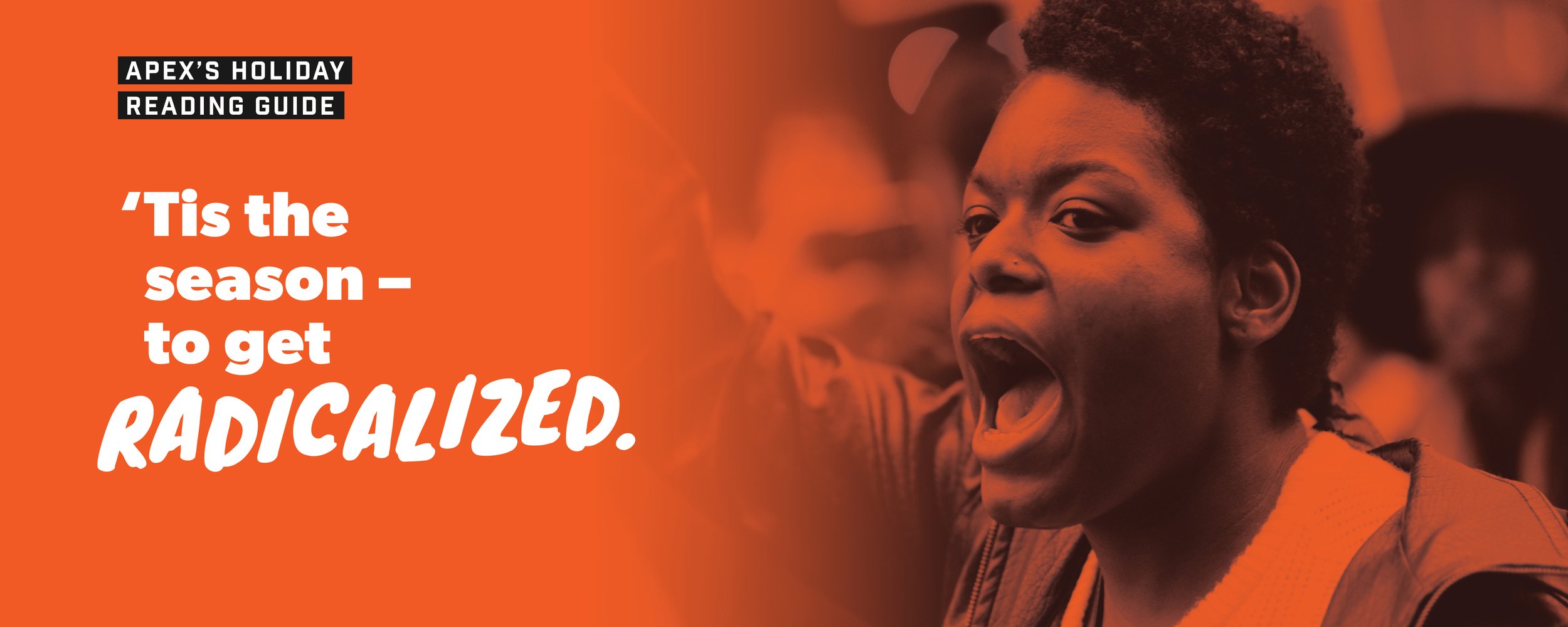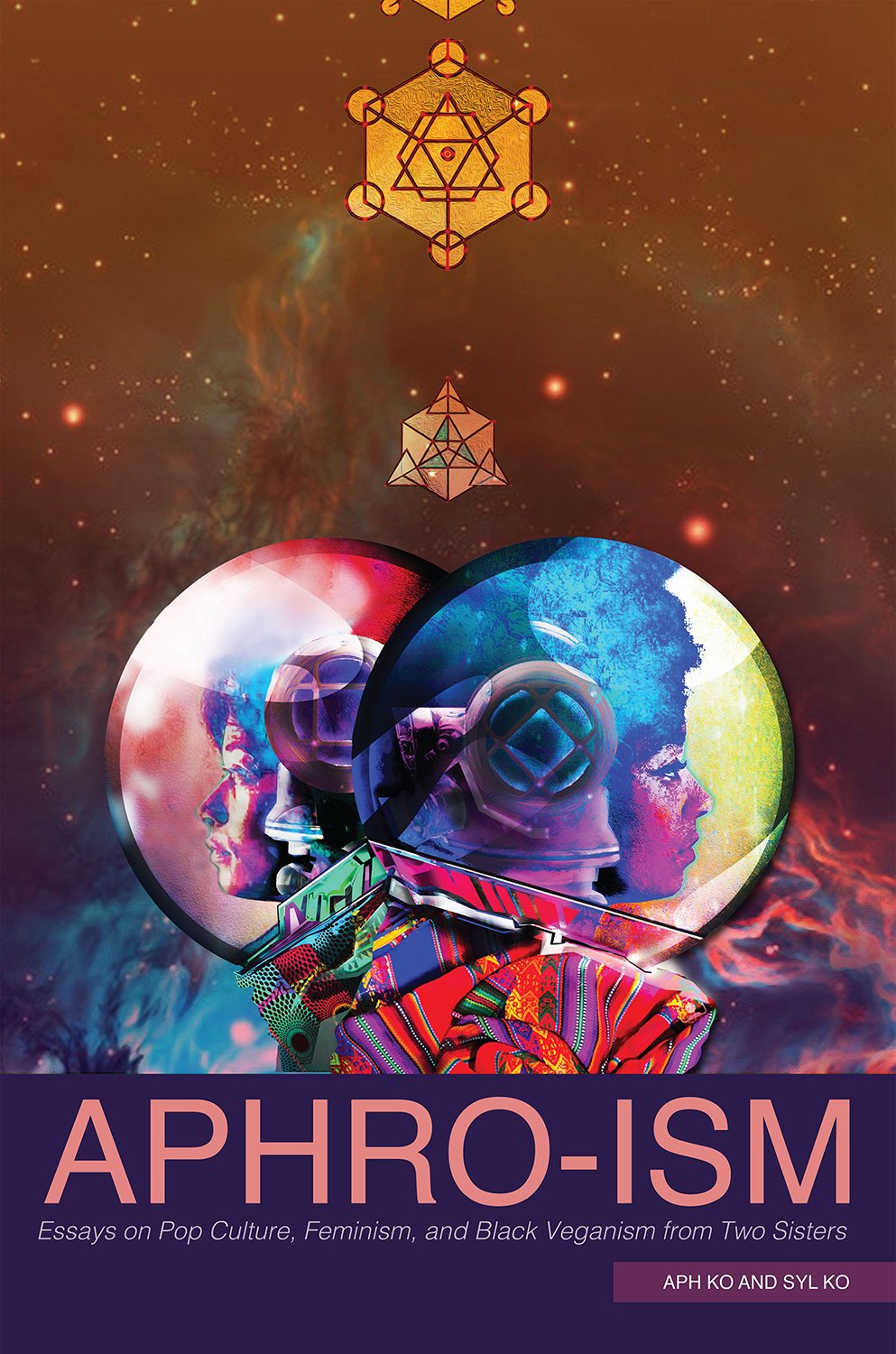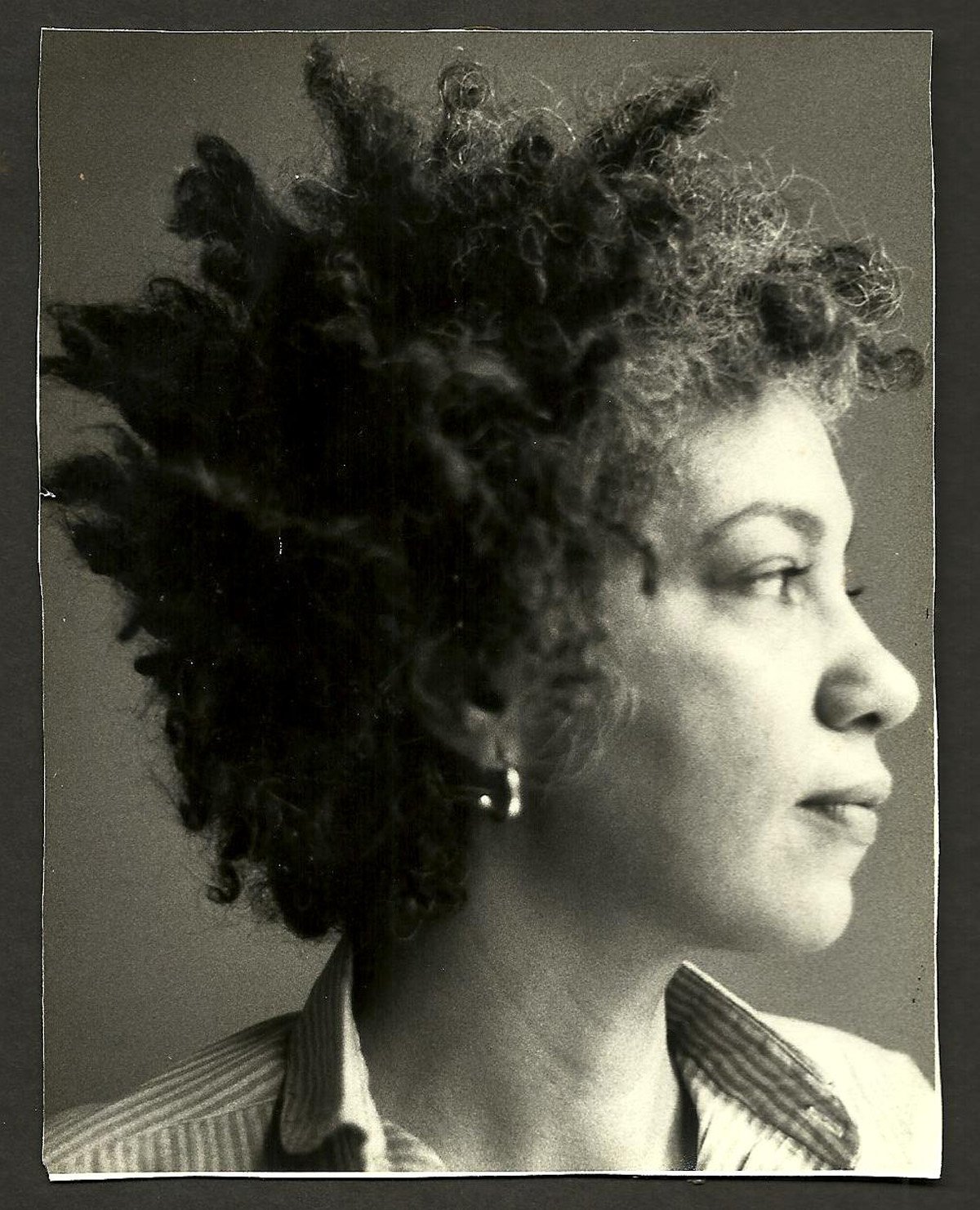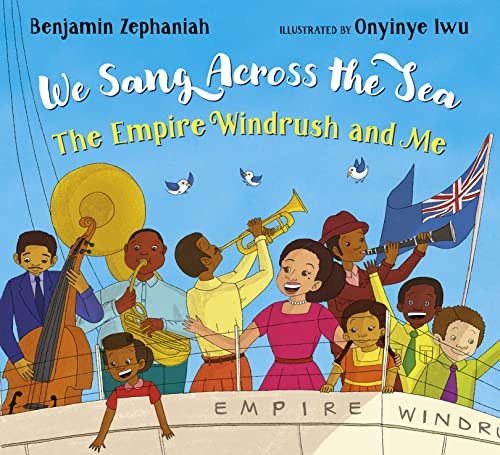APEX’s Holiday Reading Guide for the Radical Activist in Your Life
Rather than compiling a list of budget-friendly, “cruelty-free” gift ideas, this year we are turning inward and looking to fuel the activist within. The events of this year have called upon us to deepen our commitment to the dream of total liberation, our shared struggles, and our resistance against a world order which is crumbling under the weight of its own barbarity and cruelty.
And we can think of nothing better to inspire the activist within than by bringing to you our favorite social justice activists, writers, and organizers whose works explore themes such as Afrofuturism, Black liberation, speciesism/white veganism, colonialism, queerness, and of course the 75-year struggle for Palestinian liberation.
But rather than focusing on the ones we already know and love – i.e. Martin Luther King, Jr., Angela Davis, Malcolm X, Toni Morrison, James Baldwin, etc. – we want to spotlight those radical, abolitionist voices that are perhaps lesser known but equal in the power of their words and perspectives on collective liberation. (Of course, we recommend that you purchase your titles from a local bookstore or an online seller other than Amazon. Your conscience will thank you.)
With all this in mind, we present APEX’s Holiday Reading Guide for the Radical Activist in Your Life:
The Hundred Years' War on Palestine: A History of Settler Colonialism and Resistance, 1917–2017 by Rashid Khalidi
2023 was no doubt the year the struggle for the liberation of Palestine and its resistance toward Israeli settler colonialism became the foremost issue of human conflict in the world. Unnerved by the Palestinians’ self-documenting of their own genocide, many across the world have sought to understand the history of this longstanding conflict. Written by Rashid Khalidi, the foremost expert on Palestinian issues in the United States today, The Hundred Years War on Palestine traces the history of the conflict to a half century before Israel was “founded”. Khalidi, a direct descendant of the mayor of Jerusalem who first resisted the displacement of Palestinians, writes the history of his people not merely to critique the destruction enacted by the Israeli occupation, but the direct role played by the imperialism of the United States and the United Kingdom in the colonizing of Palestine. A must-read for anyone interested in how we got to where we are today…and what the future may hold for colonial powers like Israel, Britain, and the United States.
Too Black Too Strong by Benjamin Zephaniah
We recently lost Benjamin Zephaniah, one of Britain’s foremost voices in the movement for animal rights, collective liberation, and anti-imperialism.
This book contains some of his most powerful poetry on the realities of living in Britain as a Black citizen. These poems go directly to the heart of the issue and are not written to coddle anyone’s sensibilities.
Like everything Zephaniah wrote in his lifetime, Too Black Too Strong is raw, searing, and powerful. If his words don’t radicalize you, then it’s possible nothing will.
Resisting State Violence: Radicalism, Gender, and Race in U.S. Culture by Joy James
If you aren’t acquainted with the work of Joy James, this is the time to become familiar. A professor of the humanities at Williams College, James has long been a fierce and unapologetic critic of the naked imperialist aims and practices of the United States - goals which she argues require the subjugation and dehumanization of Black and Brown bodies throughout the world.
An expert in political theory, human rights, antiblackness and genocide, feminism, and abolitionism, James’s book is a must read for anyone who wishes to understand the way seemingly disparate systems of oppression are interconnected and how we can collectively challenge the white supremacist capitalist patriarchy which will upend the current of global antiblackness. She pulls no punches and even takes on her own industry: Academia.
Bonus: the foreword is by legendary activist Angela Davis, who frequently collaborates with James.
Until I Am Free: Fannie Lou Hamer's Enduring Message to America by Keisha N. Blain
If social justice is your thing, then Fannie Lou Hamer is a name you need to know, love, and understand.
Historian Keisha N. Blain collects and examines some of Hamer’s most incisive political work and speeches, placing her among the foremost civil rights leaders of her time alongside Malcolm X, Rosa Parks, and Dr. Martin Luther King, Jr. Though she died prematurely in 1977, Hamer’s words have continued to resonate with every generation of social justice activists since.
Among her immortal words is the refrain of the neglected, exploited, and forgotten: “I am sick and tired of being sick and tired.”
Sistah Vegan: Black Women Speak on Food, Identity, Health, and Society by Dr. Aimee Breeze Harper
A vegan classic by Dr. Breeze Harper, the renowned critical theorist and expert in intersectionality, anti-racism, and racial-gender inclusion/equity, Sistah Vegan is the book which first documented the journeys of Black women in the United States as they began to question the systems which claimed they needed animal products to live healthy lives. Of course, the truth is the exact opposite, and Sistah Vegan follows the journeys of Black women in all stages of life who transition to veganism as both a choice for their health and resistance against systems of oppression.
For anyone on the fence about whether to go vegan, this is often cited as the book which convinced many that the vegan choice was the right choice.
Scars: A Black Lesbian Experience in Rural White New England by Dr. Aimee Breeze Harper
If you loved Sistah Vegan and need more Breeze Harper in your life (because, really, who doesn’t?), then look no further than her novel Scars. The story traces the journey of an 18-year-old black woman named Savannah raised in rural New England. The novel explores how her upbringing affected her ability to accept her own sexuality and heal the wounds of the past and those around her.
Though this novel is purely fiction, it still touches on many of the themes present in Sistah Vegan, including interconnected systems of oppression, the privilege of whiteness, and issues of race, class, and sexuality.
Aphro-Ism: Essays on Pop Culture, Feminism, and Black Veganism from Two Sisters by Aph Ko and Syl Ko
It’s hard to pick just one book on this list as the one which you absolutely must read…but if you’re committed to social justice, then Aphro-Ism is probably that book. Recommended for anyone with an interest in intersectional social justice advocacy - and especially recommended for single-issue vegan warriors - this book is a collection of essays by two sisters (Aph Ko and Syl Ko) who bring their experiences and philosophical leanings as Black female vegans to the forefront in a brilliant critique of the mainstream, western, capitalism-inspired vegan movement and how it fails the animals and actually reinforces the very system it claims to be working against. There are so many quotable lines in this book that (if you’re like us) virtually the entire book will end up highlighted, but here’s one that captures the Ko sisters’ brilliance and stops both vegans and non-vegans in their tracks:
“Animal is a category that we shove certain bodies into when we want to justify violence against them, which is why animal liberation should concern all who are minoritized.
As long as animals are oppressed, as long as ‘animal’ means something degrading, we will never be set free.”
Racism As Zoological Witchcraft by Aph Ko
Another thought-provoking title by Aph Ko, Racism as Zoological Witchcraft draws inspiration from Jordan Peele’s acclaimed film Get Out to examine the interlocking forces of white supremacy, anti-blackness, and animal exploitation. There’s a lot to parse through in this volume, but it draws on history, pop culture, and critical race theory to enlighten readers on why racism (and specifically anti-black racism) requires the normalization of violence against animal bodies.
A modern treatise on the cause of Collective Liberation, this book is for the activist in search of clarity in what is often a confusing and disorienting space.
Life Studies (1966 - 1976) by June Jordan
An academic reader (that’s really more of a midsize pamphlet), Life Studies is a hard-to-find title but one which is well worth the effort. It contains Jordan’s writings on the educational struggles of young people of color and the societal institutions which seem hellbent on maintaining the status quo, even when the laws and social mores of the nation were moving in a decidedly more inclusive direction.
Life Studies is an intriguing read because, just like Joy James’s work, it critiques academia as both a place of enlightenment and potential liberation while also being an institutional tool of oppression.
We’re On: A June Jordan Reader by June Jordan
June Jordan was an intersectional social justice activist long before the concept of intersectionality was formally introduced. She argued that radical love was the political project which would set us free when she stated, “The ultimate connections must be the need that we find between us.” This paved the way for future concepts of intersectionality, collective liberation, and total sovereignty.
Like Audre Lorde, Jordan was a queer Black female writer and critical theorist whose work was described as always poetic yet full of searing rage. She wrote extensively on the plight of the marginalized and this volume contains many of her most revered works. We’re On is a journey through the activist soul: one that knows the work is never done and must continue, even when it struggles to find clarity and the will to survive.
The Complete Works of Pat Parker by Pat Parker
Admirers of queer poetry need no introduction to the legendary Pat Parker, but her renown has somehow escaped mainstream consciousness since her death at age 45 in 1989. A Black lesbian-feminist poet and performer, Parker spent most of her career contemplating and expressing the experience of queer Black women (and men) whose lives seemed immaterial to a nation consumed by “Gay Panic” in the 1970s and the subsequent AIDS crisis in the next decade. In spite of all the challenges she faced, she was a staunch radical and revolutionary, finding a place in both the Black Panther Party and the Women’s Press Collective. Modern poets and essayists can thank Parker for creating spaces and platforms for those queer writers and activists the mainstream preferred to ignore.
One of our favorite poems by Pat Parker:
“Fact is, blatant heterosexuals
are all over the place.
Supermarkets, movies, on your job,
in church, in books, on television
every day and night, every place -
even in gay bars.
& they want gay men & women
to go hide in the closets -
So to you straight folks
i say - Sure, i'll go
if you go too
but i'm polite
so - after you.”
Afropessimism by Frank B. Wilderson III
Of all the titles on this list, this is probably the most controversial and polarizing. For the unacquainted, Afropessimism is a philosophy and critical framework which examines the effects of racism on Black individual, communities, and nations, declaring that anti-blackness is a necessary and foundational element of the current geopolitical world order and which will ultimately lead to its undoing. Wilderson, who is regarded as one of the founders of Afropessimism, argues that, “at every scale of abstraction, violence saturates Black life.”
Like all philosophical movements, there are many branches of Afropessimism thought, though all agree that attempted inclusion of Black lives, bodies, and individuals in a global system which requires their exclusion or subjugation is a failed project and all who are concerned with Black liberation must look beyond existing frameworks.
For anyone who relishes reading radical works dealing with ontology and epistemology, Afropessimism is definitely the book for you. While it may occasionally enrage readers, it ultimately leaves them enlightened and in search of new ways of understanding what it means to be “free” and Black in the modern world.
I’m Not Yelling: A Black Woman’s Guide to Navigating the Workplace by Elizabeth Leiba
Elizabeth Leiba’s book became an instant bestseller when it arrived at the tail end of 2022. It hit a nerve with Black women who found their latent inclusion in Corporate America demanded that they bring a “non-threatening”, “professional”, and “acceptable” way of existing if they expected to last. Of course, such demands were coming from the white supremacist patriarchy which controls all aspects of Corporate America.
So why did we include I’m Not Yelling on our list for activists? Because - unfortunately - many of the problematic aspects of Corporate America have been replicated in animal protection spaces, especially in the animal rights movement in the United States which has enshrined the rigid hierarchy of corporations and subjugated its abolitionist soul to the will and whims of the movement’s new deep-pocketed donors. All of this spells trouble for BIPOC in animal rights spaces, especially for Black women who continue to be severely underrepresented in animal protection spaces.
This book provides substantial insights into navigating difficult work spaces, be they corporate or nonprofit, and will no doubt be increasingly relevant if the mainstream animal protection movement makes good on its promise to bring - and keep - more BIPOC into its ranks.
Hood Feminism by Mikki Kendall
Most people are familiar with the work of Robin D’Angelo, the professor and researcher whose work explores the many ways that whiteness, white fragility, and white privilege are reproduced and reinforced in virtually every aspect of life. D’Angelo’s work has been instrumental in educating white folk on the way all societal institutions privilege their interests.
However, for those who want a take on the same topic from a woman of color, Hood Feminism is the text you’ve been looking for. Mikki Kendall’s collection of essays takes a narrower approach to the topic by focusing on the mainstream (i.e white) feminist movement in the United States and its failure to incorporate the needs and experiences of women of color. She also calls out the blatantly self-serving premise of the white feminist movement, as evidenced in the large number of white women voting for political candidates like Ron Desantis and the 45th occupant of the White House, which has led to the repealing of rights for all American women (i.e. last year’s Supreme Court decision overturning abortion rights, a decision whose harshest impact is on women of color).
The Little Book of Vegan Poems by Benjamin Zephaniah
The Little Book of Vegan Poems contains 22 poems about (what else?) anti-speciesism and animal liberation. The volume is dedicated to, “Those vegans who will not stand for any exploitation whatever the species, and who are fighting racism and sexism with all the strength they get from what the earth provides.” This is as intersectional as it gets.
Ideal for readers aged 12 and older, this collection of poems will give readers much to think about as they become conscious of the innumerable ways in which animal exploitation features in all aspects of daily life.
Be forewarned: this book will offend meat eaters, but Zephaniah doesn’t coddle carnists. These poems are trademark Zephanian forthrightness and truth telling.
A bonus feature is that the book includes a long list of animal rights organizations that readers can connect with to deepen their understanding of relevant issues as well as their animal advocacy.
We Sang Across the Sea: The Empire Windrush and Me by Benjamin Zephaniah
A third title by Benjamin Zephaniah on our list?! Yes, because he’s that good.
A perfect gift for younger readers interested in Black history, We Sang Across the Sea is a children’s book telling the story of the Jamaican immigrants who first arrived in the United Kingdom after World War II. The story is uplifting yet does not refrain from highlighting the political forces which compelled Jamaicans to leave their native land and to immigrate to the UK under the false promise of empire and prosperity.
Young readers will no doubt have a lot of questions after reading the book, so be prepared to answer questions about imperialism, immigration, and assimilation. The illustrations by Onyinye Iwu are breathtaking and provide a wonderful balance to the story of leaving one’s home for a new land across the sea.
However you may or may not celebrate, we hope any learning and reflecting you do over the holiday season and beyond gives you the inspiration to grow as an activist and as a champion for justice.


















